Looking back on a powerful year of nuclear research and innovation
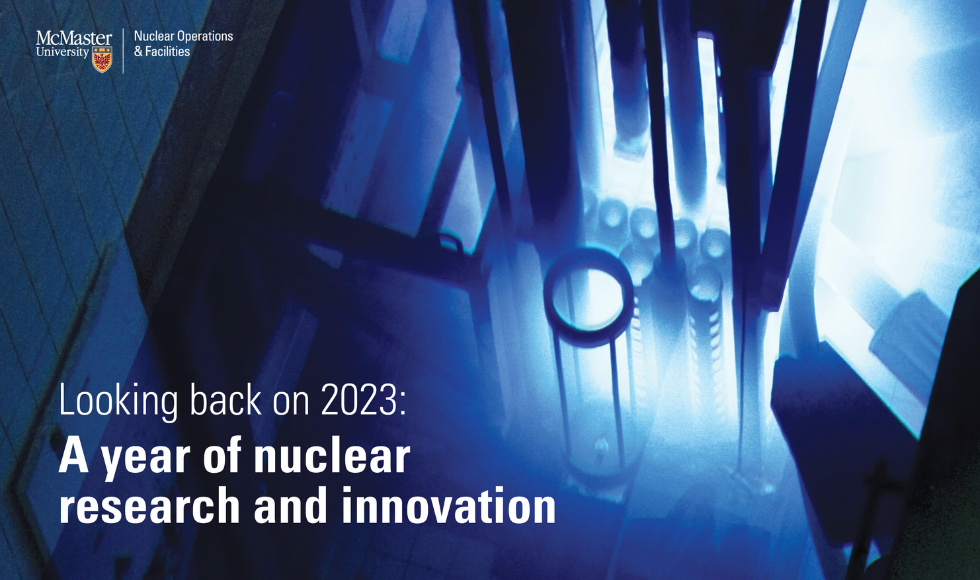
2023 was the year of innovation and new discoveries for nuclear research at McMaster.
December 21, 2023
As 2023 draws to a close, we’re reflecting on the nuclear projects, partnerships and programs that made for a powerful year of nuclear research and innovation at McMaster.
From producing life-saving medical isotopes to advancing research in clean energy and materials science, McMaster faculty, staff and students are paving a path towards a healthier and more sustainable future.
Growing McMaster’s nuclear leadership team
 Nuclear Operations & Facilities welcomed several new leaders, including three new Directors, to McMaster’s growing nuclear operations team.
Nuclear Operations & Facilities welcomed several new leaders, including three new Directors, to McMaster’s growing nuclear operations team.
The new roles are designed to ensure the safe and effective operation of the University’s nuclear facilities while enhancing its operating profile, building an expanded base of commercial products and services and enabling a far greater level of support to McMaster’s nuclear research and educational initiatives. Learn more here.
Partnering to produce medical isotopes for cancer treatment
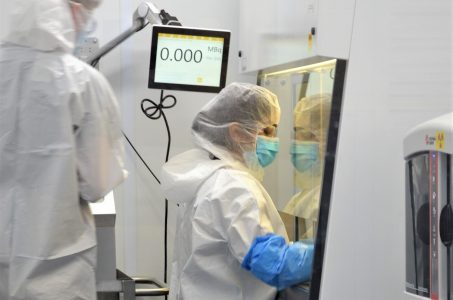 McMaster partnered with radiopharmaceutical leaders Terumo and AtomVie Global Radiopharma Inc. to increase production capacity and expand logistics coverage for two medical devices composed of holmium-166 microspheres: QuiremSpheres™ and QuiremScout™.
McMaster partnered with radiopharmaceutical leaders Terumo and AtomVie Global Radiopharma Inc. to increase production capacity and expand logistics coverage for two medical devices composed of holmium-166 microspheres: QuiremSpheres™ and QuiremScout™.
The microspheres, used to treat liver cancer, are irradiated in the McMaster Nuclear Reactor (MNR) then processed and dispensed in a new hot lab at the McMaster University Medical Centre. Learn more here.
Ontario invests $6.8M to expand McMaster’s nuclear capacity
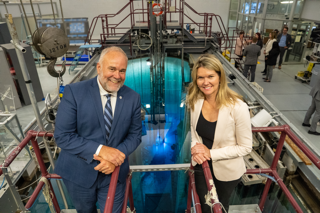 The Ontario government invested $6.8M to help strengthen research capacity at the McMaster Nuclear Reactor.
The Ontario government invested $6.8M to help strengthen research capacity at the McMaster Nuclear Reactor.
MNR’s expanded capacity will support growing demand for radioisotope-based therapies across the globe, enable more research in clean energy and small modular reactors (SMRs) and increase access to scarce neutron beam time for Canada’s world-leading materials science programs. Learn more here.
Nuclear research and education for the next generation
 McMaster University, Canadian Nuclear Laboratories (CNL) and Atomic Energy of Canada Limited launched a new program to enrich learning and real-world experience in nuclear research for McMaster undergraduate students.
McMaster University, Canadian Nuclear Laboratories (CNL) and Atomic Energy of Canada Limited launched a new program to enrich learning and real-world experience in nuclear research for McMaster undergraduate students.
The CNL Nuclear Undergraduate Research Experience program gives students in the Faculties of Engineering and Science the opportunity to conduct hands-on nuclear research in cutting-edge facilities and work with leading academic and industry experts. Learn more here.
Outstanding safety performance highlighted in MNR annual report
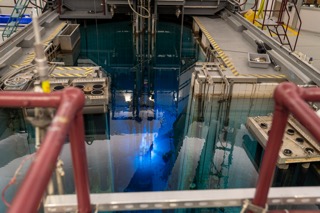 The McMaster Nuclear Reactor’s Annual Compliance Monitoring and Operational Performance report showcased MNR’s exceptional culture of safety and excellence in radiological protection.
The McMaster Nuclear Reactor’s Annual Compliance Monitoring and Operational Performance report showcased MNR’s exceptional culture of safety and excellence in radiological protection.
McMaster’s Health Physics department performed over 300,000 radiation measurements in 2022 to ensure the safety of reactor and operations staff, as well as the over 1800 visitors who tour MNR each year. Learn more here.
Federal government invests $6.8M in McMaster as part of new Canadian Medical Isotope Ecosystem
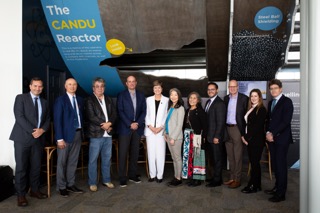 McMaster received $6.8M from the federal government as part of a national initiative to create a Canadian Medical Isotope Ecosystem (CMIE) – a pan-Canadian network for medical isotope research and innovation.
McMaster received $6.8M from the federal government as part of a national initiative to create a Canadian Medical Isotope Ecosystem (CMIE) – a pan-Canadian network for medical isotope research and innovation.
The funding will be used to expand staffing and operating hours at the McMaster Nuclear Reactor, enhancing MNR’s capacity for medical isotope research and production of custom isotopes for clinical trials. Learn more here.
Researchers awarded $1M to study small modular reactors
 Four McMaster researchers received over $1M to advance research on small modular reactors, which can provide communities with clean, abundant and reliable electricity.
Four McMaster researchers received over $1M to advance research on small modular reactors, which can provide communities with clean, abundant and reliable electricity.
The investment will enable researchers to conduct ground-breaking studies on SMRs that will help prepare Canada for SMR deployments and strengthen the country’s leadership in clean energy. Learn more here.
Pilot project tests increased operating schedule at MNR
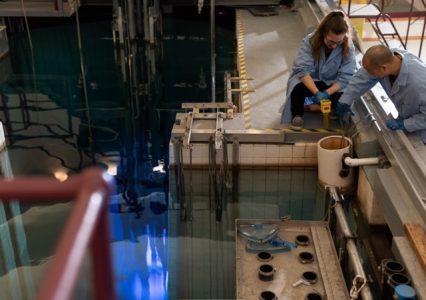 The McMaster Nuclear Reactor conducted a six-week pilot project to test an increased operating schedule that will support more research and medical isotope production at the facility.
The McMaster Nuclear Reactor conducted a six-week pilot project to test an increased operating schedule that will support more research and medical isotope production at the facility.
MNR’s planned move to 24 hours a day, five days a week (24/5) operations in 2024 will increase the reactor’s neutron output by 300%, enabling more research in medical isotopes, clean energy and materials science and facilitating more experiential learning opportunities for students. Learn more here.
Celebrating nuclear research, education and impact at McMaster
 October 16-20 was International Nuclear Science Week – a time to learn about and celebrate the incredible impact of nuclear research on our lives.
October 16-20 was International Nuclear Science Week – a time to learn about and celebrate the incredible impact of nuclear research on our lives.
McMaster welcomed visitors on a tour of the McMaster Nuclear Reactor as part of Nuclear Operations & Facilities’ Community Day. We also hosted Nuclear Now – a networking event that gave students a chance to connect with leading companies and professionals in nuclear and discover career opportunities in the field. Learn more here.
From discoveries on campus to a trip among the stars, 2023 was a big year for McMaster researchers. Learn more about the research stories that got people talking here.


